5th January was when our weather system changed. The showers which had lasted for so many weeks finally ended as high pressure and freezing temperatures took over for a while. Still we were paying now for the past weeks of rain and left with ongoing floods as the saturated land slowly drained out. This was no longer just a matter of an inconvenient obstruction to winter fishing, but of closed roads and flooded houses in places. The Wye was over its banks at Hereford and Ross, ranging for miles over the fields. There were some strange sights: solitary oak trees apparently standing in the middle of lakes. It was the really big rivers, the Severn and the Trent, which gained national attention with damage to property and house evacuations for their valleys. Whenever this happens, media and politicians focus briefly on the matter of floods and defences, and you hear the same old suggestions, chiefly that natural river channels should be dredged and deepened. On the radio I listened to a nationally known journalist calling for more assiduous dredging of channels by the EA and also an MP praising the notorious desecration of the Lugg at Dayhouse Farm as having avoided flooding this winter. I doubt it, just as the judge in that criminal case doubted it having heard the evidence, and such public figures should know better.
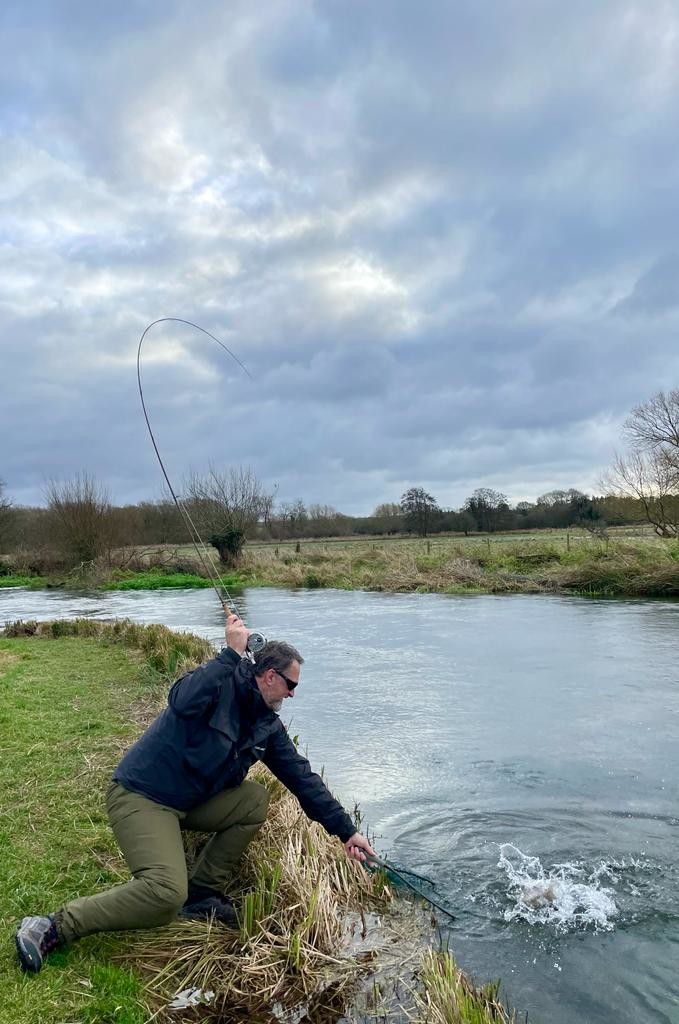 Grayling fishing on the Test - Seth Johnson-Marshall
Grayling fishing on the Test - Seth Johnson-Marshall Similar calls were heard from all over Europe; travelling anglers might be interested to hear that Slovenia is embarking on a major dredging programme on several of its famous limestone rivers. Racing the flood water downstream onto the community below merely shifts the problem a little. I liked Sir Edward Grey’s analogy of the effect of rain on roofs when trying to describe how water drains out of land. A shower on a thatched roof results in steady dripping for a couple of days. The same amount of rain on a slate roof will be dried up and gone in half an hour. Still, the rain had now ceased and in the frosty days which followed it seemed it would merely be a matter of waiting in order to restart winter fishing.
And so we waited. Before Christmas Seth Johnson-Marshall, late of the Foundation and now Communications Manager with Afonydd Cymru, made a trip with friends to fish the Test in Hampshire for grayling. They certainly caught a few grayling, but were more than surprised by the number of stock trout still in the river – I believe they caught and returned dozens of big out of season brownies. A few of us have had similar experiences, which inevitably invite comparisons to our wild fishing on the borders where we accept that all the fish have to be worked for in season. On occasions David and I have tried a winter day on the Wiltshire Avon, for example, and I took tickets once or twice on the Gloucestershire Coln at Fairford. The idea of fishing a classic chalk or limestone stream in winter for grayling is obviously attractive. You pay a day ticket price which, while comparatively expensive by our border fishing standards, is much, much, less than you would pay for a chalk stream day after trout in the mayfly season. Chalk streams are less likely to flood in winter, they do grow grayling and you usually catch lots of fish. The problem is that usually most of them are the wrong species, which opens your eyes to just how heavily many chalk stream beats are stocked during the trout season. Please don’t misunderstand me about this; I am not one who advocates that all stocking on chalk streams should be banned. Chalk streams, apart from being so interesting biologically, have also been for a couple of centuries an important part of the local rural economy. Their fisheries are businesses, and relatively high turnover ones at that. With salaried keepers and complicated maintenance schedules, costs are necessarily high and therefore ticket and membership prices have to match. Such customers have high expectations of the fish they will catch. It is difficult to see how this could be changed without neglecting the network of carriers and water meadows which define a classic chalk valley. I will predict – and indeed hope – that chalk streams are allowed to carry on much as they are, because of the history and tradition, and because of the beauty of this very special environment. However, let’s not imagine that it is typical fly-fishing; rather accept that it is great fun, but something quite artificial.
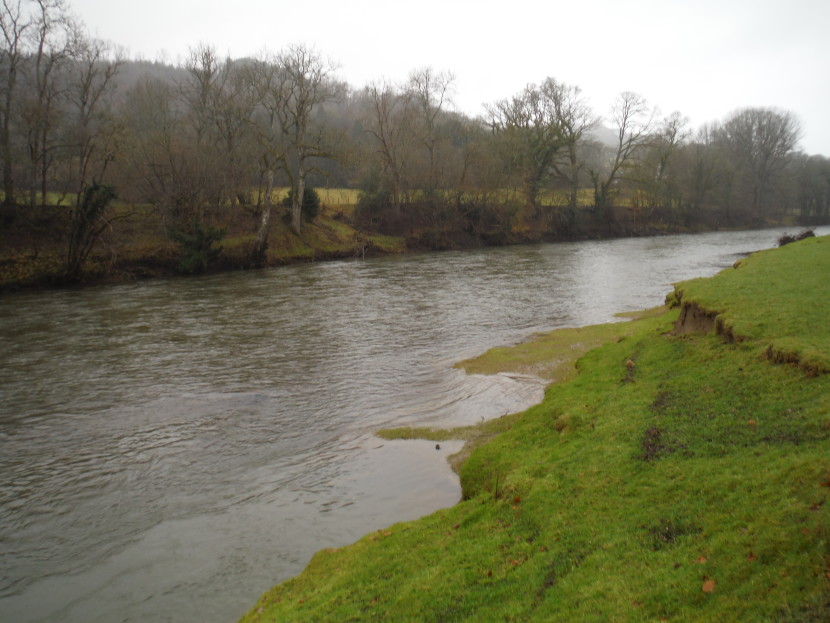 Water high but clear
Water high but clear 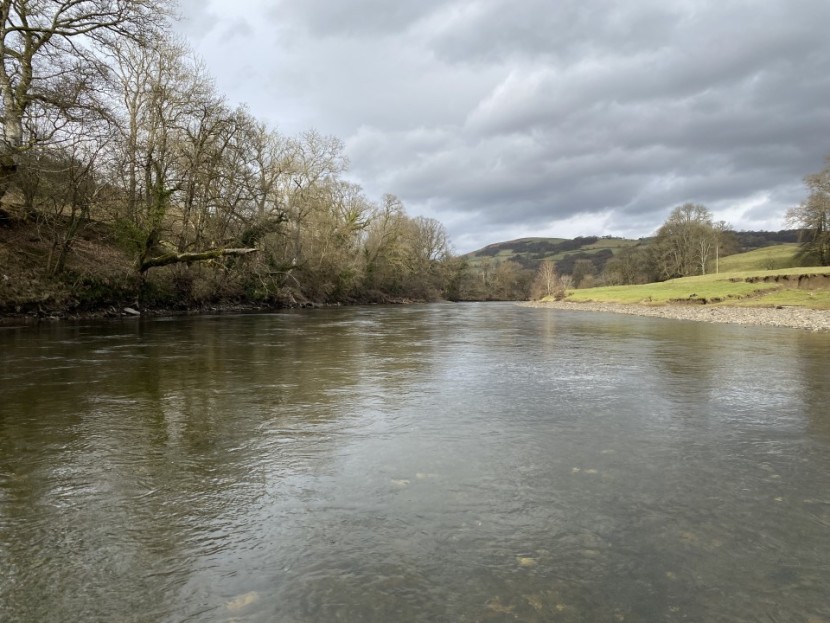 Weather front coming - FR from Hereford
Weather front coming - FR from Hereford By the weekend of the 13th, the rivers were definitely in condition, running cold and clear. It might have been good spawning weather, if not so late in the season. The exception was the Lugg, rising on Radnor Forest and always slow to come down after a flood. Nevertheless, JP from Southam managed a couple from Lyepole on the Saturday, and one of these was his very first grayling. BA from Epsom with his father fished at How Caple Court and they accounted for a pike and a chub. SH from Weston Super Mare was at the Creel and caught a barbel, a chub and a pike, one of each. PR from Bath with a friend managed a very respectable pike of 17.6 pounds while roaming on Dean and Chapter. ST from Blackwood with two friends managed 3 grayling from Doldowlod and PW from Blakemere caught 3 more at The Rectory. The cold now had us in its grip for a while and Forest of Dean pools iced over. Fishing everywhere was tough: R from Swansea had a couple of grayling while fishing heavy nymphs at Abernant on the 15th while PD from Cheltenham managed one in a three hour session before the cold got to him. CH from Bridport and KO from Barry with a friend came to coarse fish the middle Wye on successive days, but both blanked. PL from Monmouth with a friend tried The Rectory on the 18th, but accounted for just one grayling on the float between them. GM from Lutterworth fished the Lugg at Lyepole in minus 6 degrees air temperature and caught 3 grayling.
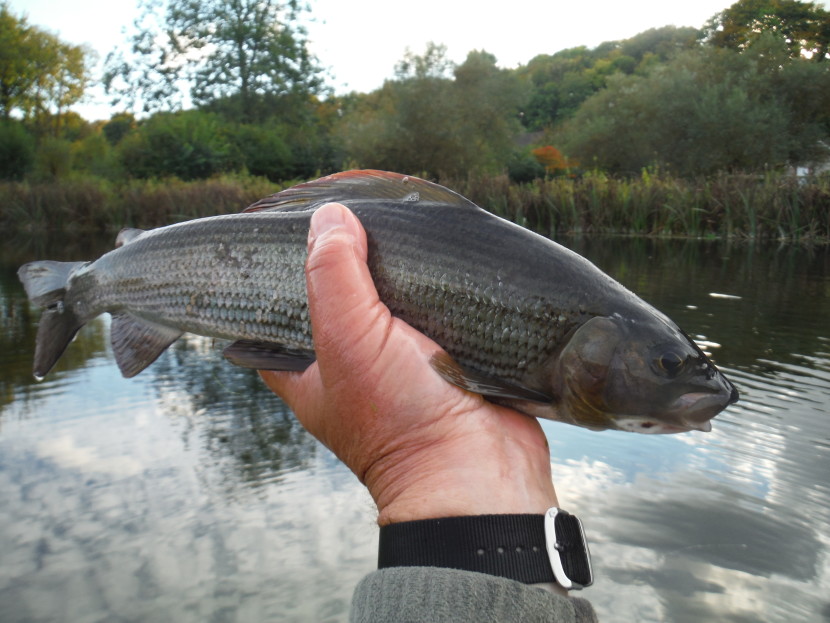 Autumn and a chalk stream grayling
Autumn and a chalk stream grayling 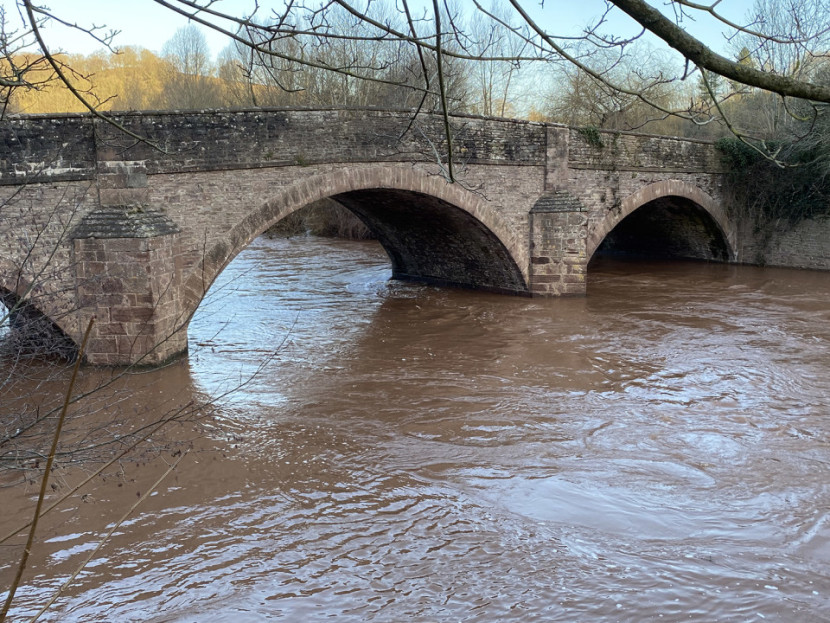 No fishing at Skenfrith - MR from Monmouth
No fishing at Skenfrith - MR from Monmouth Storm Isha, the latest in a series this winter, was approaching from the west and bringing warmer temperatures with it, but there was one more very cold day to endure. On the 19th GM from Bristol spent a day in sub-zero temperatures at Middle Hill Court and was rewarded with a chub of 4 pounds 9 ounces. By the 20th the winds were increasing along with the air temperature. FR from Hereford had 2 grayling at Abernant although the margins were still icy. BG from North Piddle had a good grayling trotting the Arrow at the Leen and PW from Blakemore had a couple at the Rectory. TT from Tillingham fished in rising winds at How Caple Court on the 21st, but was forced to desist by the afternoon. We had a tremendous storm that night in Wales and the West, and by next morning our rivers were once more in flood. Angling now seemed to be a matter of dodging the storms and the floods and there were a few opportunities. JA from Hereford fished at Whitney Court on the 23rd as Storm Jocelyn came in and the river was once more rising, but he managed 2 barbel and 3 chub. CM from Keynsham with a friend had 3 barbel to 8 pounds plus a chub from Middle Hill Court. The fact that barbel were still turning up in catches indicated that the water was not yet unduly cold. The river was rising again on the 25th, but IS from Gloucester accounted for 3 barbel and 15 chub fishing at How Caple. He mentioned that otters were showing regularly, which tends to happen during the day in such conditions. Otters too find the hunting easier during a flood. GL from Abergavenny had 7 chub to 5 pounds at Foy Bridge and TH from Cranbrook with a friend 10 barbel and 5 chub at Middle Hill Court. Also on the 25th, MR from Monmouth drove over to Skenfrith to get an idea what the fishing might be like on the following day. The water looked good, so he took heart and booked on, but he was confronted by a muddy flood when he arrived next morning and there was no fishing to be had. It’s surprising the effect that just a couple of hours of rain during the night will have when the ground is already as saturated as it is now and rain is often quite localised.
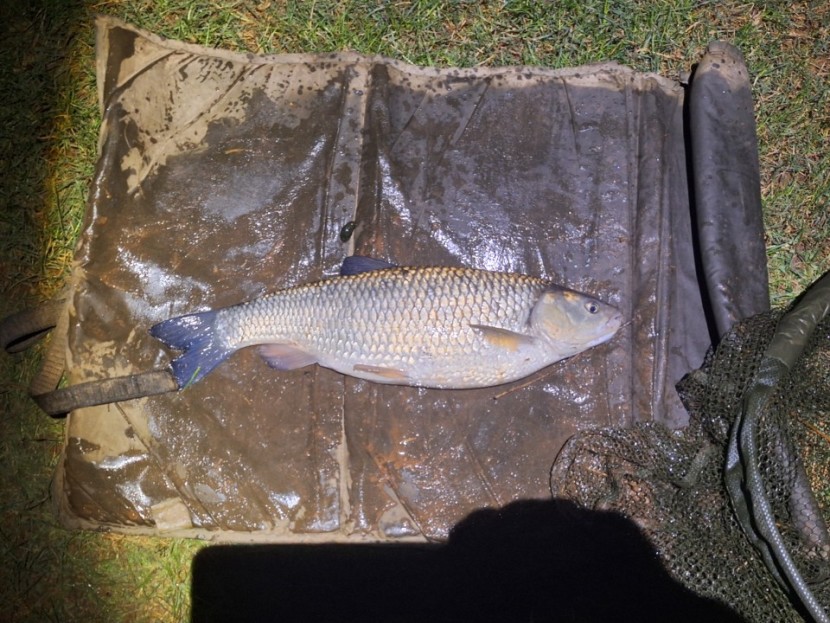 Middle Hill Court - GA from Bristol
Middle Hill Court - GA from Bristol 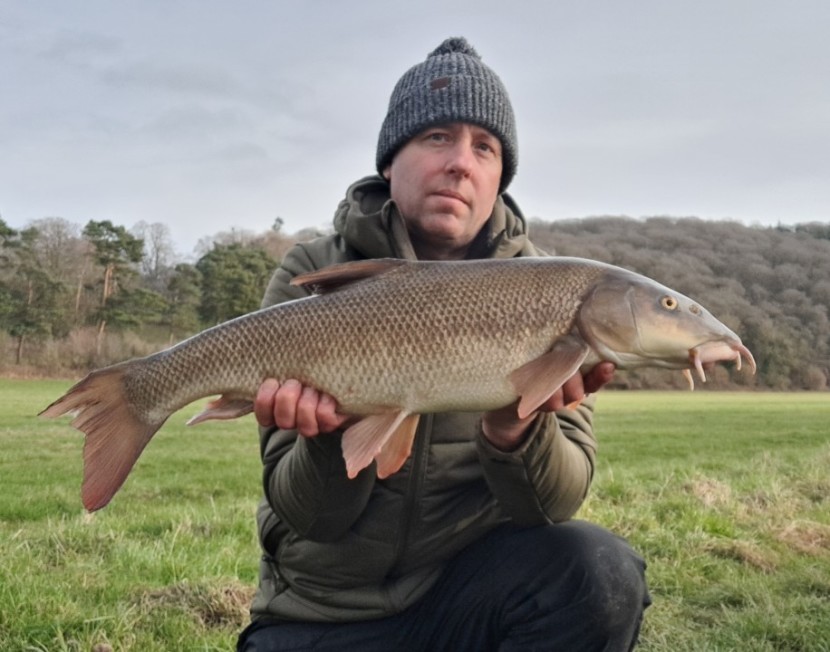 GB from Bristol - How Caple Court
GB from Bristol - How Caple Court With warm weather continuing and levels falling in most areas, I was hoping for some results during the final weekend of January. On the Friday SB from Birmingham had 6 chub from Middle Hill Court. MK from London trotted the Arrow at The Leen on Saturday and had a brace of specimen grayling at 2 pounds. MS from Bridgewater with a friend fished at Middle Hill Court for 2 grayling and 12 chub. RE from Cwmbran also had a grayling while fishing Middle Hill Court the same day along with a dozen chub. Grayling are not unknown on the lower river, but it’s nice when they turn up in the catch. Down on the Rhymney a “Welsh Grayling Cup” was held over the same weekend. Fishing was difficult but grayling to 50 cm (19 inches) were caught. On the Sunday GB from Bristol took a pair of barbel to 8 pounds 8 ounces along with 12 chub at How Caple Court. Also fishing at How Caple Court on the same day was SH from Weston Super Mare, who had some complaints to make about ticket prices and a lack of bank maintenance on the River Wye. He also suggested that cheaper fishing tickets should be available when the fishing is difficult. The WUF included a detailed reply to these complaints and the situation of the Wye with SSSI status. Our rivers are wild compared to many and likely to remain so. The idea of a daily moving scale of ticket price graded by difficulty as easy, moderate, tough etc, is clearly impractical. I will add the obvious point that fishing is a market based on what people will pay and prices are rather like buying a house, in that the further away from London or other major population centre you go, the cheaper it gets! Finally I see that SH reported a catch of a sea trout and a chub. Sea trout are not unknown in the Wye, but they are not common. I may be wrong, in which case I will apologise in advance for this suggestion, but after long periods of muddy flood in the main river, the native brown trout’s natural colouring washes out to a general pale grey with dark spots and this tends to be the way they look in the spring. Their season of course begins on March 3rd. Finally CM from Keynsham took 2 barbel to 9 pounds 2 ounces and 2 chub from How Caple Court on the 30th.
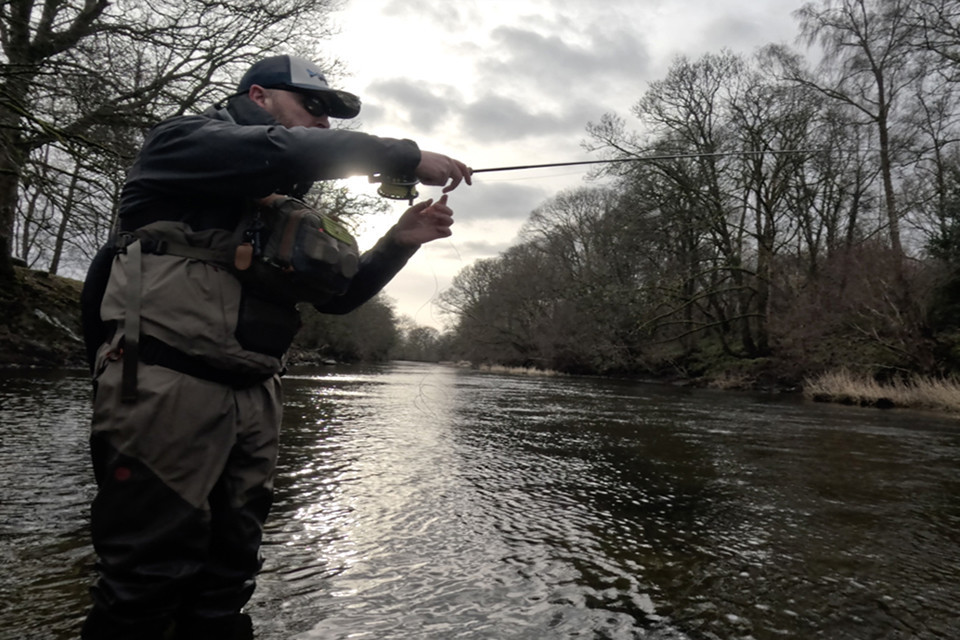 Doldowlod - Lyn Davies
Doldowlod - Lyn Davies Here is a dramatic story involving a lady and a salmon she hooked in the Elan tributary in October 1869. Seth Johnson-Marshall found this one from back numbers of The Welshman newspaper while researching for the “Welsh River of the Month” series from Afonydd Cymru. Try to imagine the scene long before the Elan’s great dams were built and the valleys became inland seas to supply water to Birmingham. If while reading it you wonder how any salmon could give so much trouble over 17 hours, the answer is made clear towards the end – it was apparently foul-hooked between the dorsal fin and the tail. At the finish of it all, the fish was lost. It must have been quite a night.
“A LADY'S BATTLE WITH A SALMON. A correspondent in Land and Water writes: Miss Lewis Lloyd of Nantywillt, near Rhayader, Radnorshire, was fishing for salmon on the morning of Monday, October 4tb, in the pool (Llyn Brawd) formed by the junction of the rivers Claerwen and Elan, a short distance below her father's house. About 11.15 she rose and hooked a large fish. Miss Lloyd at once gave her rod to William Lloyd, her father's old carpenter, a first-rate fisherman, and he having crossed the Elan, was joined by Miss Lloyd on the right bank, which is a much better place to fight a fish than the place from which the fish was hooked. It was evident at once that the contest would be an obstinate one, as the fish showed an unusual power. He made a great rush and jumped out of water, and then sulked a long time, so that it was necessary to stone him, which had but a very slight effect, indeed it was thought that the only result from throwing the stones was to excite the curiosity of the salmon to find out what they were. So the time passed, hour after hour went slowly by. Spectators began to crowd the bank, attracted by the unusual event, until the light began to give way to the dusk of evening. But there was no change, either the salmon lay quiet or sailed slowly about the pool. As it became dark his movements were rather more rapid. Soon it was dark, and then a large fire of turf was made, and it became necessary to get lanterns. Miss Lloyd then gave up her rod to William Lloyd, and he, alternately with Miss Lloyd, fought the fish to the end, and admirably did they do their work, with a patience and steadiness—although they must both have been nearly wearied out—that was the admiration of all who know what it is to fight a big salmon.
Well, to make a long story as short as possible, the long hours of the evening gave way to the short hours of the morning and still the same. The spectators were weeded out, until some thirteen, male and female, gentle and simple, were left, and these were determined to watch the battle to the end. It was very wearisome. Every now and then the monotony was relieved, however, by exclamations from whoever had the rod, which caused all to desert the fire and gather together by the water. Once the reel stuck as the fish was running out, and then it looked as if something must give, but the reel turned again and all was safe. Then he ran out a long line, and turned and came in so fast as to cause a quantity of slack line that it was thought for an instant he was lost; again he ran out every inch of line, but luckily he stopped at the right moment. It was out of the question attempting to hold him, he would have broken the tackle like a thread if it had been tried. At last, about 3 a.m., when the night had become pitch dark, a horrified cry came from old Will, who then had the rod, He is going out of the pool, Miss," he shouted. What a rush there was, up jumped everyone, away went the old veteran bearing on the fish all he dared, he might as well have attempted to have stopped a locomotive. Out of the pool went the salmon, and into the river after him plunged the gallant old fellow, utterly regardless of 64 years and the rheumatism. I shall never forget the scene, the river was like ink, except where long streaks of foam shone in the light from the fire, where the river roared and rattled over the rough ground, and then disappeared in impenetrable darkness. Some three or four men followed at once with lanterns Old Will in his white coat, which gleamed out in the fire light, supported by two men, his elbows pressed close to his sides, showing that he was fighting the fish as hard as he could. Thus the party faded from our sight. Away went one good fellow to fetch a horse for Miss Lloyd to cross the river on, but the pace was too good to wait for anyone or anything suffice it to say that in a very short time we were altogether again about a quarter of a mile down the river. How all got there it is difficult to say, some crossed and recrossed the river, others, among whom was one fair spectator, who no one expected for an instant could follow, performed a most creditable steeplechase across some very nasty country rendered more difficult by the intense darkness. The party was completed at last by the arrival of one enthusiast whose career had been checked by finding himself at the bottom of a deep wet ditch. But we were all cheered up on hearing that the salmon was safe. There were the men in the river just in front of us, and we could hear by the rattling of the reel that the gallant salmon was still fighting hard for his life; once he came close to one of the men who might have gaffed him, but he was perhaps over cautious. It is, however, an open question whether under the circumstances it would have been safe to have attempted to do so. But, alas, after a few minutes, who can describe our feelings upon hearing “He is gone!" from old Will. Sure enough the sorely tried single gut cast had broken, or more probably had been cut by a stone a few inches from the fly, and the noble fish had saved his life.
Slowly the party came out of the water; scarcely a word was spoken and a salmon fisher can thoroughly enter into our feelings at the moment; it was a great disappointment to us all to lose the fish after so long a battle, which had lasted about seventeen hours, as it was nearly a quarter past four when the line broke. When the salmon came close to the man in the water, he could see that the fly had struck about half-way between the back fin and the tail, hence his enormous power; it was almost impossible at any time to draw the fish in toward the bank. It can be easily understood that the power of resistance to the rod was enormous, as a very slight movement of the tail of such a salmon, would be sufficient to resist a great weight. The salmon was supposed by those who saw him to be from 151b. to 181b. weight. The length of Miss Lloyd's rod, which is not more than 15ft. 4in., must be considered but I do not think a more powerful rod would have made much difference; some difference of course it would have made, but not much, owing to the place where the fish was hooked.”
I once had an invitation, one which unfortunately could not be taken up, to visit Fort Bragg in the USA. The idea was to talk about peace keeping to American soldiers about to deploy in the Balkans. “Never mind,” said military friends on hearing that I was headed for Afghanistan instead, “you wouldn’t like the humid weather in North Carolina at this time of the year. Nobody does.” But I was interested this last year to read that the name of Fort Bragg, the biggest military base in the USA, has been changed to Fort Liberty, although awarding the name of locally-born Confederate General Braxton Bragg had seemed appropriate enough when the base was founded in 1918. This decision for change was not a military, but a political one, taken in the wake of the George Floyd protests in 2020. More of the same is to come. Some 10 military installations named after Confederate figures are similarly due to be renamed, as are several US Navy ships. The other day I watched a U-tube video of General JEB Stuart’s statue being taken down in the city of Richmond, Virginia. Ernest Hemingway had one of his characters describe Jeb Stuart as the most brilliant cavalry leader of the modern era, although unluckily for Stuart he chose the losing side in the Civil War. Today we think we know better about so many things of course. For all that, the idea and the reality of a statue of him existing in Richmond seemed be acceptable for more than 150 years. Times have now changed and since attacks during 2020 on the city’s statues of Confederate leaders, contractors are quietly craning them onto low loaders and taking them away, either for storage or for oblivion. I will come back to Richmond and the American South.
Recently we seem to have entered a new age of iconoclasm and intolerance. In 2001 there was outrage when the Afghan Taliban used rocket propelled grenades to deface ancient figures of the Buddha in Bamiyan province. Their reasoning was that the once revered statues of another religion were an offence to their strict modern version of Islam. Now, in our own society, we too are removing statues of those figures of the past which no longer correspond with or otherwise offend our modern ideals. Not long ago, there were raucous cheers from a crowd as a statue was tumbled into Bristol harbour. But let me put to you, almost at random, three prominent names from the pages of history. You won’t need me to tell who or what they were and what they achieved. Consider the Macedonian Alexander, Julius Caesar and Napoleon Bonaparte. Imperialists? Certainly, and highly successful ones at that. They all won the title of “Emperor.” Wholly admirable in their ethics and deeds? Far from it. Each of them was certainly familiar with human slavery and saw nothing particularly wrong or unnatural in it. On the other hand, the imperialists I have mentioned all had a very creative aspect to their lives. For one example alone, the Napoleonic code of justice is still the basis for law in many European countries. Is each or any of them worthy of a statue though? Absolutely. Each of these men, in their own time, moved the world. We can only try to understand the environment they moved in, look and wonder. The statue in itself doesn’t necessarily imply even conditional admiration for everything they believed or did. And there is no logic in trying to apply modern laws or mores to figures from history. Will we reach the point where we cannot tolerate the memory of anybody who did not think exactly as we do now?
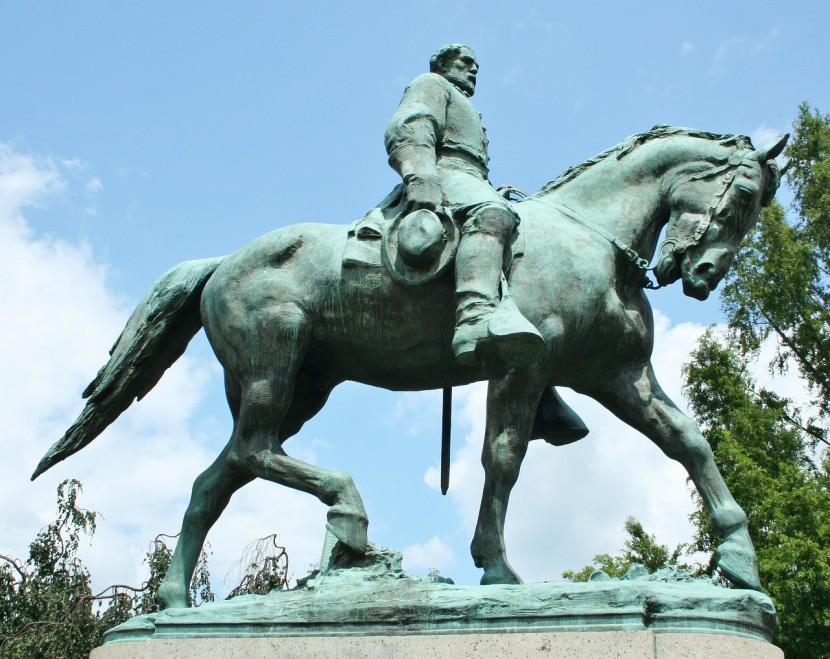 Robert E Lee
Robert E Lee Take a more recent example and returning to the American situation – the secessionist General Robert E Lee. Secessionist is the word generally used, and certainly the Confederacy was the side he took in the civil war. Lee was a “southern gentleman,” clear enough, but he was also acknowledged to be the most competent general officer of the small army the United States had at that time. When it all began he was offered by the War Department in Washington the command of the Union Army to be sent to punish the rebellious South. Pushed to make a choice, he declined, declaring that his love for Virginia outweighed his loyalty to the Union. So he took command of the Army of Virginia and then commanded the forces of the Confederacy through thick and thin to the war’s end, when he signed the surrender at Appotomax Courthouse. Union General and later to be President Ulysses Grant and all his staff doffed their hats to him as he left. Robert E Lee, beloved by the men he commanded, deeply respected by his opponents, was a tragic figure, a man of honour, but trapped like so many others in an unavoidable war. Now the statues of him are being taken down all over the South, the accusation being that they glorify slavery. Does gazing on a statue of the southern general on his famous horse Traveller imply the onlooker’s wish that the Confederacy had won the civil war, or that slavery had continued? Of course not. It’s a reminder of a tragedy which must never be repeated. It probably isn’t fashionable to quote the jurist and civil war veteran Oliver Wendell Holmes these days, despite that famous “…in our youth our hearts were touched with fire” speech. But he fought three years for the Union and ever after displayed the same spirit of understanding and forbearance towards a defeated enemy, now once more to be fellow citizens, which characterised both Lincoln and Grant:
“We believed that it was most desirable that the North should win, we believed in the principle that the Union is indissoluble, we, or many of us at least, also believed that the conflict was inevitable, and that slavery had lasted long enough. But we equally believed that those who stood against us held just as sacred conviction that were the opposite of ours, and we respected them as every man with a heart must respect those who give all for their belief.”
Until the late 1930s, after which time there were few survivors left, veterans from both sides of the civil war used to meet and stay in a joint camp on the field of Gettysburg, to shake hands, to reminisce, to try to understand what had happened. It seems they were bigger men than we, who often find it difficult to respect even those who voted the opposite way in the 2016 referendum. I have to concede that the early 20th century films of the veterans’ camp at Gettysburg seem to show no black participants.
Here is an example from nearer home, from my father’s old college, Oriel at Oxford. The college and students from all over the world have benefitted for over a century from the bequest of Cecil Rhodes, who up till now has been honoured accordingly. Rhodes was, like most of us, a man of his time. He made a fortune out of diamond mining in South Africa before devoting much of his remaining life to an imperialist dream. Rhodes had a plan for a British Africa which would have Cairo linked to Cape Town by a great railway. Rhodes was an imperialist all right, but I think not a racist in that he remarked that no man’s colour should ever disqualify him from any position or task. No, he didn’t mention women. My father, who spent some of the Second World War teaching people to fly in what was then Southern Rhodesia, talked often about Rhodes and Rhodes Scholars. The best known in modern times of these scholars benefitting from the philanthropy of Cecil Rhodes is probably Bill Clinton. More surprisingly, you might also try to imagine a tall young man named Kris Kristofferson from Brownsville, Texas as a Rhodes Scholar at Merton College. The scheme must have done something for the Special Relationship. Nelson Mandela, no less, attended the centenary celebrations for Rhodes at Oriel College and gave a speech in praise of the benefactor. “That’s good enough for me,” remarked Chancellor Chris Patten, referring to the Mandela visit as the statue came more recently under criticism. Sad to tell, the college having experienced further pressure later considered having the statue removed (it’s still there at the moment). I wondered at the time if they would return the money left in the bequest to the Rhodes family? My initial reaction was that some of our university authorities were being remarkably spineless when criticised by the new iconoclasts.
There is one big argument, you might think, against the case I am making here for retaining statues and other emblems from history. If you or I had been an American, British or Russian soldier fighting our way into Germany in 1945, would we have avoided tearing down the swastika flags when we came to them? Well, certainly not, I would have been trampling on them like everybody else. I can’t find any justification, anything admirable at all, in the cult of fascism. On the other hand I would cheerfully look up to the statue of General Irwin Rommel, which does exist in his home town of Heidenheim. After recent discussions, the statue of a landmine amputee has been erected next to it. Rommel’s forces laid enormous numbers of mines in North Africa. In fact millions of mines were laid by all forces in WWII, which continue to kill and maim to this day.
The legacy of the Francoist past is one which Spain has had to confront. For example, I once noticed carved into a post which stands in the beautiful Generaliffe gardens of the Alhambra in Granada, the emblem of a tied bunch of arrows. A fascist symbol in an Arab garden must have been applied by somebody during the 1940s or 1950s, but nobody has tried to remove the carving. On reflection, I think I would vote for leaving it, simply because it tells a story about an era and an opinion. We used to say that the last great fascist memorial in Europe was Franco’s Valley of the Fallen, which is a huge church under a tall cross quarried into the mountains north of Madrid by the slave labour of republican prisoners of war. It was supposed to commemorate all the dead of the Spanish civil war, but the overwhelming impression given is one of triumphalism from the victors. At his request, Franco was buried under a slab in the floor. More recently his body has been moved and reburied by his family in his home town. Truth to tell, I preferred the earlier arrangement, which several times gave me the pleasure of walking on the dictator’s grave.
 Tito
Tito Street names are similar to statues and Eastern Europe in recent years has experienced a spate of renaming streets and squares. Communist heroes are out and the names of some distinctly dubious figures from World War II are creeping back. When my wife was just 10 years old, she was the little girl chosen by the Party to present Comrade Tito with a bunch of flowers when he came to visit her home city of Mostar. Sure enough this was a period of hero worship, the cult of personality. Tito, with his white and gold uniforms, his sun-glasses, his cigars and mistresses had a style which the Balkans liked. Every time he set off in his yacht to another non-aligned conference he was cheered on his way. Then every town in Yugoslavia had a Marshal Tito Street or a Marshal Tito Square as its centre point and in the side streets and the parks other Partisan heroes from World War 2 were duly saluted. But what names have now come to replace them? In modern Bosnia, or to be more precise, in the areas now under Muslim control, the names of some remarkably obscure Muslim writers and poets have been put forward by literary historians. You can always trust the academics to follow political direction. Hardly anybody has heard of these writers before, but their background in what was in their own time a predominantly Turkish culture is now the right one. Not of course the great writer Ivo Andric, the country’s only Nobel prize winner and author of The Bridge on the Drina and Travnik Chronicles, because both his parents were Croats. Meanwhile in Croatia and in Croatian-controlled parts of Bosnia, Tito and the Partisans as inspirations for street names and statues are steadily being replaced by some old fascists from the past.
Fascism and Nazism are words which are used much too easily these days by emotional people on the left who have no experience of the real thing. Fascism had a great flowering (if I can use that word) during the 1930s and 40s, but it did not subsequently die. Instead, these days they mostly keep it well hidden. Now and then the mask slips, as it did in the Balkan wars during the 1990s, and what you see is frightening. In fact real fascism is alive and well today in what is now the eastern part of the European Union, which is one of the reasons why I was glad to leave that club.
The other day a Hungarian gentleman living here told me he believes that in this country we are slowly losing the gift of freedom of speech. He is one who would know. In the UK at the moment, some people and institutions are in a frenzy of anxiety to be seen to be politically correct by the mores of our time. Nothing, it seems, should commemorate an individual in history whose values wouldn’t be thoroughly approved of by the liberals of today. Clearly some of us don’t much like our past or even our present. The problem is, that if we look far enough back, we are all of us quite likely to find something we don’t like. From childhood I can remember racist remarks made occasionally and without much thought by my mother and her friends in the suburban coffee morning set. In literature you don’t have to go back as far as Shakespeare or even Dickens to find anti-semitic portrayals. And some quite well known writers of the early 20th century were quite prepared to propagate or reflect anti-semitic views: John Buchan and Ernest Hemingway would certainly be on the list. The boys’ adventure story writer Percy F Westerman made some awful remarks about any of his characters who were not safely Anglo-Saxon. Such writing stopped, quite suddenly, in the early forties when the horrors of the holocaust in Europe became known. You might imagine that the liberal Guardian newspaper of today would be embarrassed that the original Manchester Guardian was founded by John Edward Taylor in 1821 on a fortune largely earned by trading in slave-grown cotton. On the other hand, in its editorials and from the earliest days, the newspaper took a stand against slavery. The history of the Guardian, I think, rather proves the point I want to make.
The arts are always the first to suffer as free speech is lost. The back catalogue is slowly being revised: old movies and TV programmes can still be shown, but tend to be prefaced with defensive phrases like: “…made between 1972 and 1981, portraying outdated attitudes and speech which may now cause offence.” I would settle for a cautionary statement like that on a plaque if they would only leave the statue. Even the rock and roll business has begun to undertake revision; when I hear Elvis Costello’s Oliver’s Army on the radio these days, I notice the “N” word has been blanked out. Not so however with the Who and their 1960s hit Substitute, in which Roger Daltrey still carols: “I look all white but my dad was black.” I am surprised nobody has chosen to be offended.
We seem to have an obsession at the moment with apologising or demanding apologies for past mistakes and injustices, almost without a time limit. Such formalistic apologies rarely seem to be helpful and often have the opposite effect, making everybody feel angry and uncomfortable. Undoubtedly the most serious war crime committed in Europe since World War II was the massacre at Srebrenica, the mass killing by Bosnian Serb troops of around 8,000 Muslim men and boys of the Bosnian Army in summer 1995. For years much of the Serbian and Bosnian Serb population was in denial that the massacre had even happened, but by 1999 and 2000 my OHR office in Zvornik was promoting the return, initially in small but later in increasing numbers, of displaced Bosnian Muslims to their burned out villages around Srebrenica and Bratunac. By this time videos actually taken during the massacre had been publicised in Serbia and the uncomfortable truth was generally becoming widely accepted in Belgrade as well as in Serbian controlled areas of Bosnia. Return was a painfully slow and incremental process, inherently dangerous to the participants, and achieved with patient negotiations between former neighbours and with security support from local Serb police firmly backed up by NATO commanded forces, in this case American and (believe it or not) Russian. Meanwhile, month by month and as quietly as possible, the international tribunal continued with the grisly task of excavating the graves of massacred victims all over the region. As we opened up the overgrown and ruined Muslim villages, as the countryside was repopulated and people began to rebuild their homes, pathetic rag-clothed skeletons which had lain in the open during the years since 1995 began to be found. These were the bodies of the Muslim men and boys who had been cut down in the forest while trying to reach Bosnian Government lines. Eventually more than 100 of these were sent to the galleries of Tuzla’s salt mines for preservation and eventual DNA testing.
At the same time, organisations of displaced Srebrenicani, mostly with no intentions to return, were insistent in having an annual ceremony at the scene and that there should be an appropriate and permanent memorial on site. They were right to do so of course and the international community as a whole was determined that they should get it. I knew some of the people concerned, including two different associations of Mothers of Srebrenica who had been my beneficiaries in the last days of the war. There isn’t much you can say to a woman who has lost her husband, brothers and sons. Still, the annual commemoration ceremony with participants bussed in by convoy from their new homes in Sarajevo and a massive security operation to prevent attacks from Serb hardliners, had the effect of delaying ordinary returns operations for months. It had to be done, but it had the effect of slowing down local reconstruction and even reconciliation, which was occurring slowly but in a much less publicised way. There seemed to be a choice: we could talk on a public stage about one of the greatest crimes of the 20th century or we could talk locally about reconciliation and slow steps towards co-operation for those who were prepared to try to live with each other again, but it was difficult to do both at once.
When the late Queen made her much-discussed and long delayed visit to Dublin in 2011, there were many voices clamouring for an apology for all the wrongs the English had visited on the Irish, apparently covering everything from the potato famine to the Black and Tans. She made no apology, wisely so, but she did make a very good speech acknowledging the pain which the peoples of these islands have caused each other in the past, as well as the close linkages which do exist. She included the sentence: “With the benefit of historical hindsight, we can all see things which we would wish had been done differently, or not at all.”
I am not usually a great cheer-leader for France’s President Macron, but I was interested to see he laid a wreath at Napoleon Bonaparte’s tomb on the 200th anniversary of the emperor’s death. “Napoleon is part of us,” he told dissenters. He took a stronger position when demonstrators in Paris and other towns threatened to damage statues and memorials. The President ordered the police to use tear gas in the traditional French manner (demonstrating and policing has always been a rougher game on both sides there) and stated simply that: “France will not be revising its history.” End of chat, I suppose. Here in Britain the new iconoclasts seem to cherish the belief that they are the first generation to have read a little history and so become enlightened. Thus they justify the pitching of a statue into Bristol harbour. My response would be that I was certainly taught at an early age in school that Bristol and Liverpool were built on the proceeds of the slave trade, and we were also told how the trade worked and how and why it ended. I would remind that in a world history of empires, practically all of which ran on the principle of slavery, I think I am correct to say that the British Empire was one of the first to turn against slavery, to ban slavery within its own territory and to take effective action against the international traffic. I often think that those who are so vociferous and critical about the history of the British Empire might do better to address continuing slavery in the modern era, perhaps beginning with the region of the Arabian Gulf.
In Britain new legislation now ensures that planning permission will be required before statues are removed, which should give time for thought and possibly hold back any more precipitate actions by iconoclastic demonstrators. I’m also pleased to see that the Oriel College authorities, having waited quite a time for a commission of inquiry to make its report, have decided to keep their Rhodes statue. However, there is now a “contextualising” piece about Rhodes on the Oriel website (giving a much more critical view of the benefactor than I would have written) and there will eventually be a similar contextualising plaque about Rhodes near the statue. I’m happy with that. In future somebody wandering down Oxford High Street will be able to see the statue and then the plaque, one presumably representing the prevailing view of 1905 and the other that of 2024. Which makes for a very British compromise.
Oliver Burch